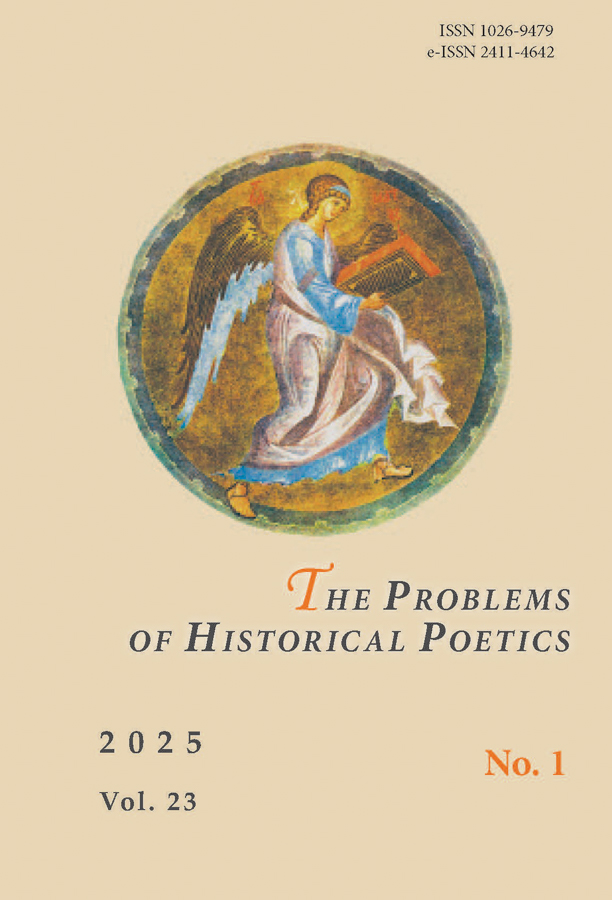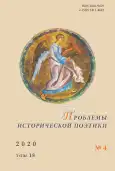“Playing the victim”: the pathos of denunciation and martyrdom in the works of Ivan the Terrible and Andrey Kurbsky
- Authors: Popovich A.I.1
-
Affiliations:
- Ural Federal University
- Issue: Vol 18, No 4 (2020)
- Pages: 67-98
- Section: Articles
- URL: https://journal-vniispk.ru/1026-9479/article/view/286014
- DOI: https://doi.org/10.15393/j9.art.2020.8743
- ID: 286014
Cite item
Full Text
Abstract
The article explores changes in the use of the categories of victim and sacrifice in political literary artefacts in the second half of the 16th century: namely, the correspondence between Ivan the Terrible and Andrey Kurbsky and Kurbsky’s History of the Grand Prince of Moscow. The study shows that the writers of this time used the literary topoi of victim in a fundamentally different way to earlier authors in medieval Russia. The article defines the main means of poetics and rhetoric in the works of Ivan the Terrible and Andrey Kurbsky. The methods for updating the topoi of victim for both authors are similar. Each of them desacralizes a high Christian idea and uses it and a topos for subjective and, as a rule, ideological purposes. Such changes are possible due to the mixing of earthly (profane) and heavenly (sacred) logic when dealing with the categories of victim and sacrifice, which is typical for this time. If, for Kurbsky, the people killed by the tsar are new martyrs, then for Ivan the Terrible, they are justly punished traitors. The tsar believes that subjects should be ready to sacrifice their lives for him. Kurbsky does not deny the necessity of willingness to sacrifice, but he consistently proves that the tsar’s personality does not correspond to Christian ideas about the ideal monarch, so he convinces the reader of the possibility of confronting the tsar. At the same time, both authors characterize themselves as a person affected by the actions of the other and use the literary topoi of victim.
About the authors
Alexey I. Popovich
Ural Federal University
Author for correspondence.
Email: alexeypopowich@mail.ru
Laboratory Researcher, Laboratory for the Study of Primary Sources
Russian Federation, ul. Mira 19, Yekaterinburg, 620002References
- Averintsev S. S. Rhetoric as an Approach to the Generalization of Reality. In: Averintsev S. S. Ritorika i istoki evropeyskoy literaturnoy traditsii [Averintsev S. S. Rhetoric and the Origins of the European Literary Tradition]. Moscow, School “Languages of Russian Culture” Publ., 1996, pp. 158–190. (In Russ.)
- Bulanin D. M. Political Doctrine in Aphorisms: Little-Known Sources of the First Epistle of Ivan the Terrible to Andrey Kurbsky. In: Die Welt der Slaven [The World of the Slaves], 2019, vol. 64, issue 1, pp. 87–107. (In Russ.)
- Bulychev A. A. Mezhdu svyatymi i demonami: zametki o posmertnoy sud’be opal’nykh tsarya Ivana Groznogo [Between Saints and Demons: Notes on the Posthumous Fate of the Disgraced Tsar Ivan the Terrible]. Moscow, Znak Publ., 2005. 304 p. (In Russ.)
- Vasil’ev V. K. Syuzhetnaya tipologiya russkoy literatury XI–XX vekov: (Arkhetipy russkoy kul’tury). Ot Srednevekov’ya k Novomu vremeni [The Plot Typology of Russian Literature of the 11th–20th Centuries: (Archetypes of Russian Culture). From the Middle Ages to the New Age]. Krasnoyarsk, Institute of Professional Development of the Siberian Federal University Publ., 2009. 260 p. (In Russ.)
- Gladkiy A. I., Tsekhanovich A. A. Kurbsky Andrey Mikhailovich. In: Slovar’ knizhnikov i knizhnosti Drevney Rusi [The Dictionary of Scribes and Booklore of Ancient Russia]. Leningrad, Nauka Publ., 1988, issue 2, part 1, pp. 494–503. (In Russ.)
- Erusalimskiy K. Yu. Sbornik Kurbskogo. Issledovanie knizhnoy kul’tury: v 2 tomakh [Collection of Kurbsky. The Study of Book Culture: in 2 Vols]. Moscow, Znak Publ., 2009, vol. 1. 882 p. (In Russ.)
- Erusalimskiy K. Yu. Purpose of the “History”. In: Kurbskiy A. M. Istoriya o delakh velikogo knyazhestva moskovskogo [Kurbsky A. M. History of the Affairs of the Grand Prince of Moscow]. Moscow, Nauka Publ., 2015, pp. 221–287. (In Russ.)
- Kalugin V. V. Andrey Kurbskiy i Ivan Groznyy: teoreticheskie vzglyady i literaturnaya tekhnika drevnerusskogo pisatelya [Andrey Kurbsky and Ivan the Terrible: Theoretical Views and the Literary Technique of an Old Russian Writer]. Moscow, Yazyki russkoy kul’tury Publ., 1998. 416 p. (In Russ.)
- Kantorowicz E. Kh. Dva tela korolya. Issledovanie po srednevekovoy politicheskoy teologii [Two Bodies of the King. A Study on Medieval Political Theology]. Moscow, The Gaidar Institute Publ., 2015. 752 p. (In Russ.)
- Karavashkin A. V. Russkaya srednevekovaya publitsistika: Ivan Peresvetov, Ivan Groznyy, Andrey Kurbskiy [Russian Medieval Publicism: Ivan Peresvetov, Ivan the Terrible, Andrey Kurbsky]. Moscow, Prometey Publ., 2000. 418 p. (In Russ.)
- Karavashkin A. V. Ivan the Terrible and Andrey Kurbsky: A Conflict of Interpretations. In: Studia Litterarum, 2020, vol. 5, no. 1, pp. 148–161. doi: 10.22455/2500-4247-2020-5-1-148-161 (In Russ.)
- Klibanov A. I. Dukhovnaya kul’tura srednevekovoy Rusi [The Spiritual Culture of Medieval Russia]. Moscow, Aspekt Press Publ., 1996. 368 p. (In Russ.)
- Krom M. M. «Vdovstvuyushchee tsarstvo»: politicheskiy krizis v Rossii 30–40-kh godov XVI veka [“The Dowager Kingdom”: The Political Crisis in Russia of the 30s — 40s of the 16th Century]. Moscow, Novoe literaturnoe obozrenie Publ., 2010. 872 p. (In Russ.)
- Kurbskiy A. M. Istoriya o delakh velikogo knyazya moskovskogo [History of the Affairs of the Grand Prince of Moscow]. Moscow, Nauka Publ., 2015. 942 p. (In Russ.)
- Likhachev D. S. The Style of Grozny’s Works and the Style of Kurbsky’s Works (Tsar and “Sovereign Traitor”). In: Perepiska Ivana Groznogo s Andreem Kurbskim [Correspondence of Ivan the Terrible with Andrey Kurbsky]. Moscow, Nauka Publ., 1981, pp. 183–213. (In Russ.)
- Likhachev D. S. On the Way to a New Literary Consciousness (Second Half of the 16th Century). In: Likhachev D. S. Velikiy put’: stanovlenie russkoy literatury XI–XVII vv. [Likhachev D. S. The Great Way: The Formation of Russian Literature of the 11th–17th Centuries]. Moscow, Sovremennik Publ., 1987, pp. 174–184. (In Russ.)
- Likhachev D. S. The Conceptosphere of the Russian Language. In: Russkaya slovesnost’: ot teorii slovesnosti k strukture teksta: Antologiya [Russian Literature: from the Theory of Literature to the Structure of the Text: Anthology]. Moscow, Academia Publ., 1997, pp. 280–287. (In Russ.)
- Lur’e Ya. S. Fate of Fiction in the 16th Century. In: Istoki russkoy belletristiki: vozniknovenie zhanrov syuzhetnogo povestvovaniya v drevnerusskoy literature [The Origins of Russian Fiction: The Emergence of Genres of Storytelling in Old Russian Literature]. Leningrad, Nauka Publ., 1970, pp. 387–449. (In Russ.)
- Lur’e Ya. S., Romenskaya O. Ya. Ivan IV, Ivan the Terrible. In: Slovar’ knizhnikov i knizhnosti Drevney Rusi [The Dictionary of Scribes and Booklore of Ancient Russia]. Leningrad, Nauka Publ., 1988, issue 2, part 1, pp. 371–384. (In Russ.)
- Perepiska Ivana Groznogo s Andreem Kurbskim [Correspondence of Ivan the Terrible with Andrey Kurbsky]. Moscow, Nauka Publ., 1981. 430 p. (In Russ.)
- Popovich A. I. Victim “Living” and “Dead”. A Topos and the Contradiction of Context in the Books of Ancient Russia of 11th–14th Centuries. In: Letnyaya shkola po russkoy literature, 2019, vol. 15, no. 2–3, pp. 115–135. doi: 10.26172/2587-8190-2019-15-2-3-115-135 (In Russ.)
- Rudi T. R. Topoi of Russian Lives (Typology Issues). In: Russkaya agiografiya: Issledovaniya. Publikatsii. Polemika [Russian Hagiography: Research. Publications. Polemic]. St. Petersburg, Dmitriy Bulanin Publ., 2005, vol. 1, pp. 59–101. (In Russ.)
- Slovar’ knizhnikov i knizhnosti Drevney Rusi [The Dictionary of Scribes and Booklore of Ancient Russia]. St. Petersburg, Dmitriy Bulanin Publ., 2012, issue 2, part 3. 768 p. (In Russ.)
- Skrynnikov R. G. Tsarstvo terrora [The Kingdom of Terror]. St. Petersburg, Nauka Publ., 1992. 576 p. (In Russ.)
- Uvarov K. A. Knyaz’ A. M. Kurbskiy — pisatel’ («Istoriya o velikom knyaze Moskovskom»): avtoref. dis. … kand. filol. nauk [Prince A. M. Kurbsky Is a Writer (“The Story of the Grand Prince of Moscow”). PhD. philol. sci. diss. abstract]. Moscow, 1973. 25 p. (In Russ.)
- Uspenskiy B. A. Poetics of Composition. In: Uspenskiy B. A. Semiotika iskusstva [Uspensky B. A. Semiotics of Art]. Moscow, Shkola “Yazyki russkoy kul’tury” Publ., 1995, pp. 9–218. (In Russ.)
- Uspenskiy B. A. Tsar’ i patriarkh: kharizma vlasti v Rossii (vizantiyskaya model’ i ee russkoe pereosmyslenie) [Tsar and Patriarch: Charisma of Power in Russia (Byzantine Model and Its Russian Rethinking)]. Moscow, Shkola “Yazyki russkoy kul’tury” Publ., 1998. 680 p. (In Russ.)
- Filyushkin A. I. Andrey Mikhaylovich Kurbskiy: prosopograficheskoe issledovanie i germenevticheskiy kommentariy k poslaniyam Andreya Kurbskogo Ivanu Groznomu [Andrey Mikhailovich Kurbsky: Prosopographic Study and Hermeneutic Commentary on the Letters of Andrey Kurbsky to Ivan the Terrible]. St. Petersburg, St. Petersburg State University Publ., 2007. 624 p. (In Russ.)
- Shmidt S. O. Notes on the Language of the Letters of Ivan the Terrible. In: Trudy Otdela drevnerusskoy literatury [Proceedings of the Department of Old Russian Literature]. Moscow, Leningrad, Academy of Sciences of the USSR Publ., 1958, vol. 14, pp. 256–265. (In Russ.)
- Hunt P. Ivan IV’s Personal Mythology of Kingship. In: Slavic Review, 1993, vol. 52, issue 4, pp. 769–811. (In English)
- Halperin Ch. J. Ivan the Terrible: Free to Reward and Free to Punish. Pittsburgh, University of Pittsburgh Press Publ., 2019. 360 p. (In English)
- Madariaga I. Ivan the Terrible. First Tsar of Russia. Yale, Yale University Press Publ., 2006. 526 p. (In English)
Supplementary files











